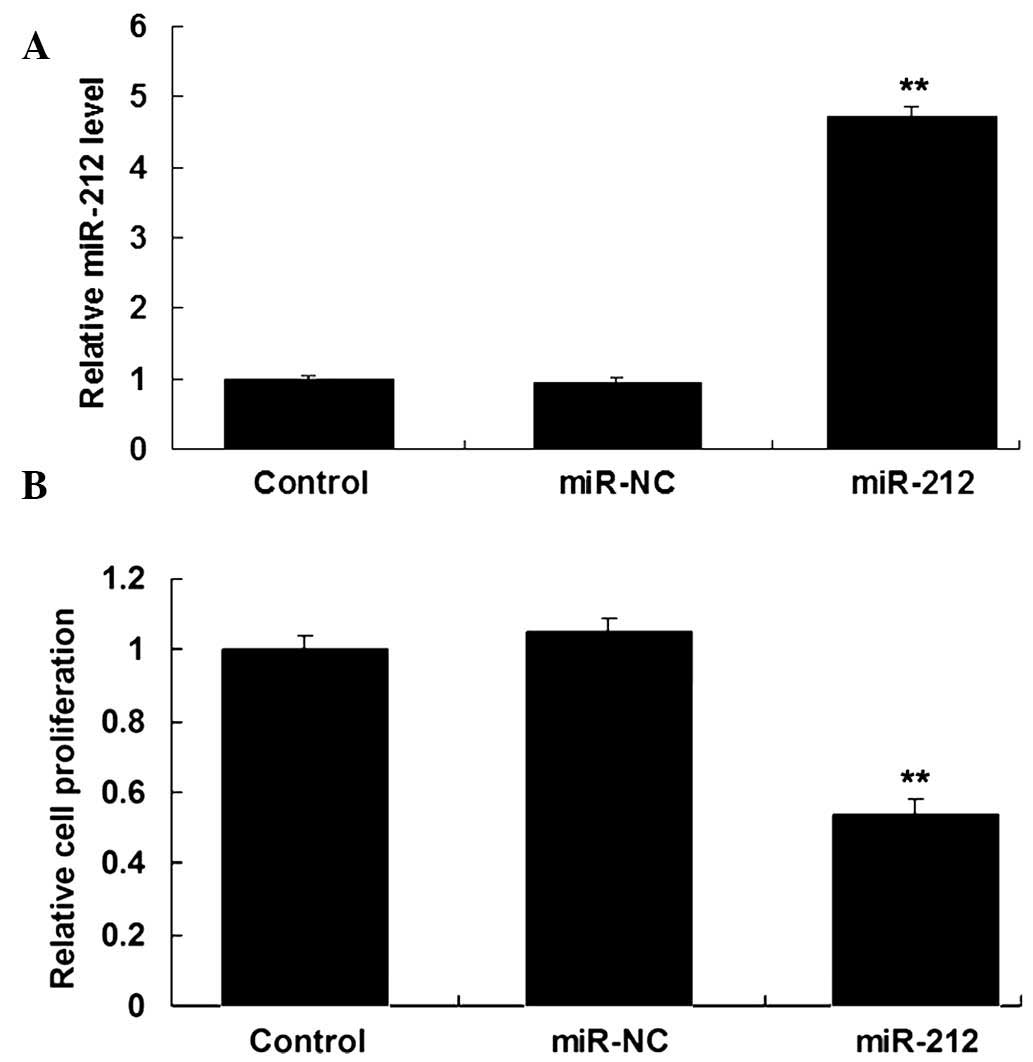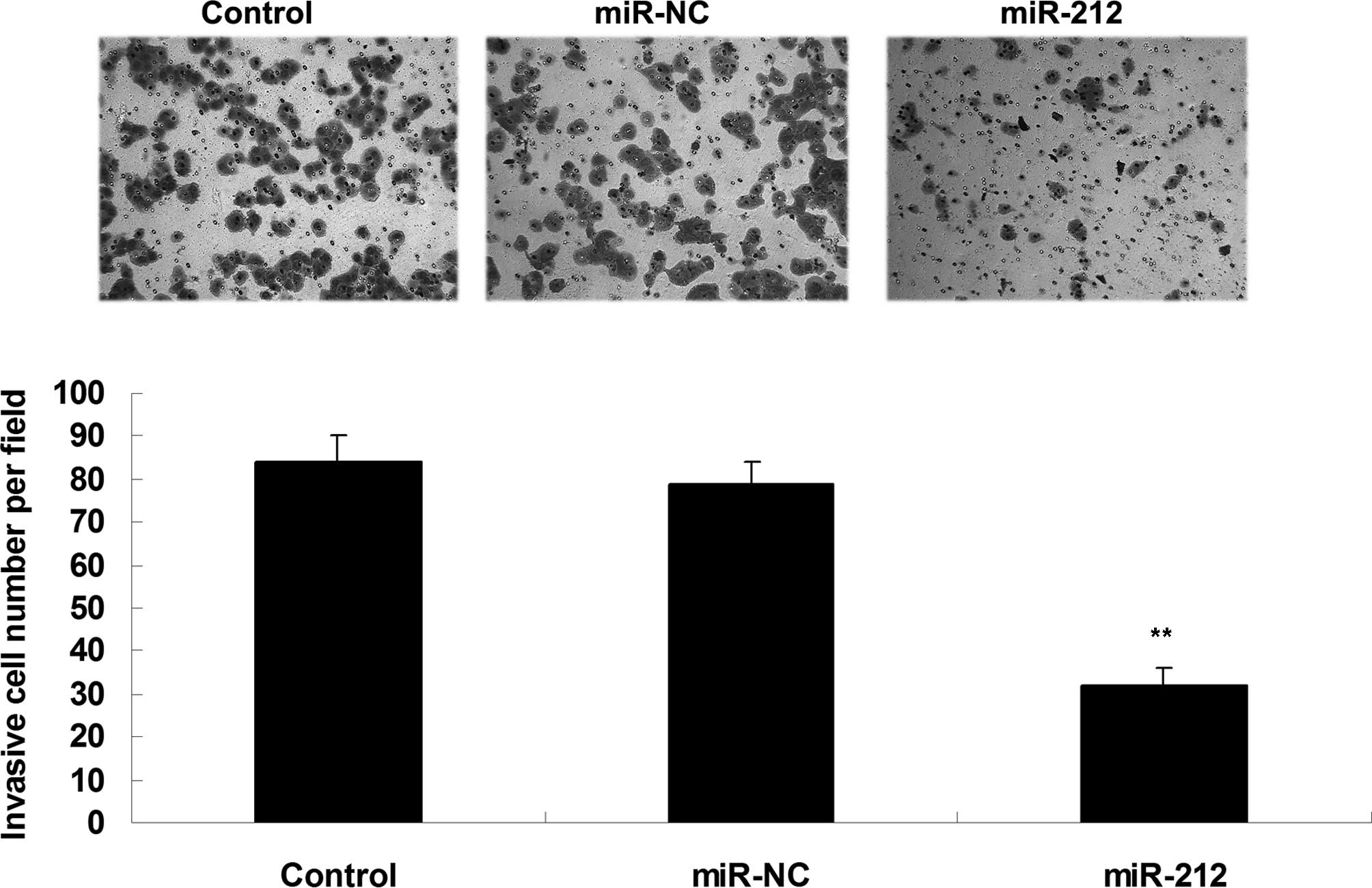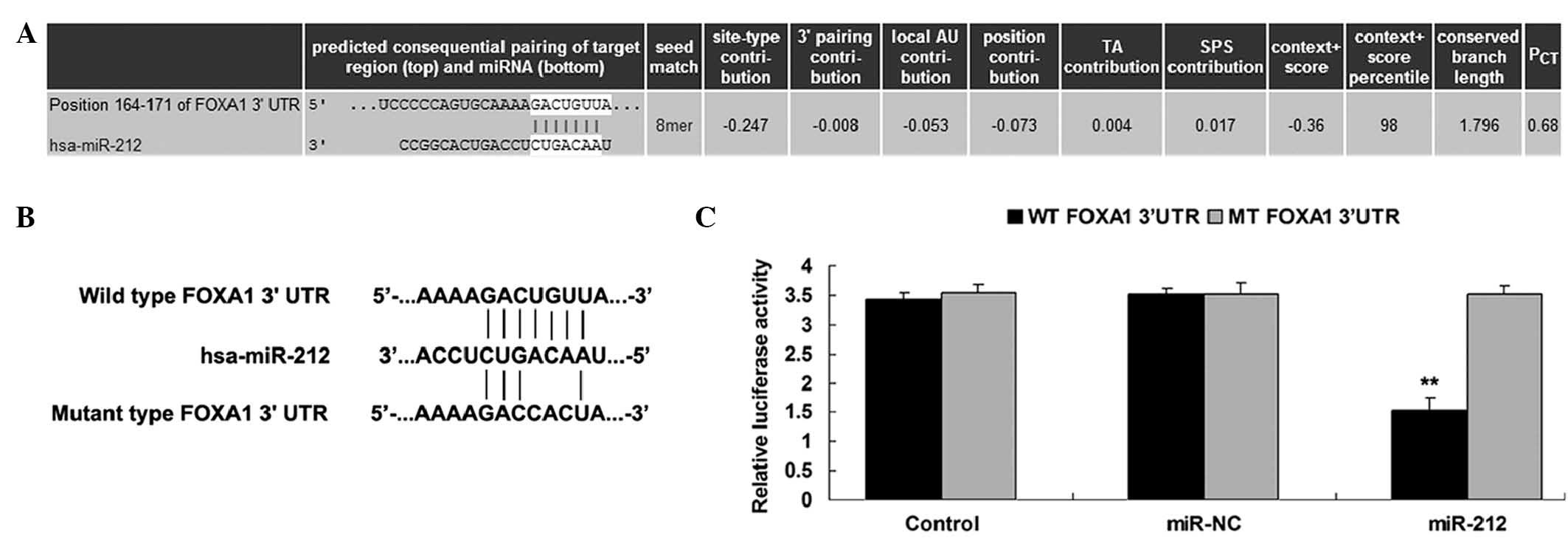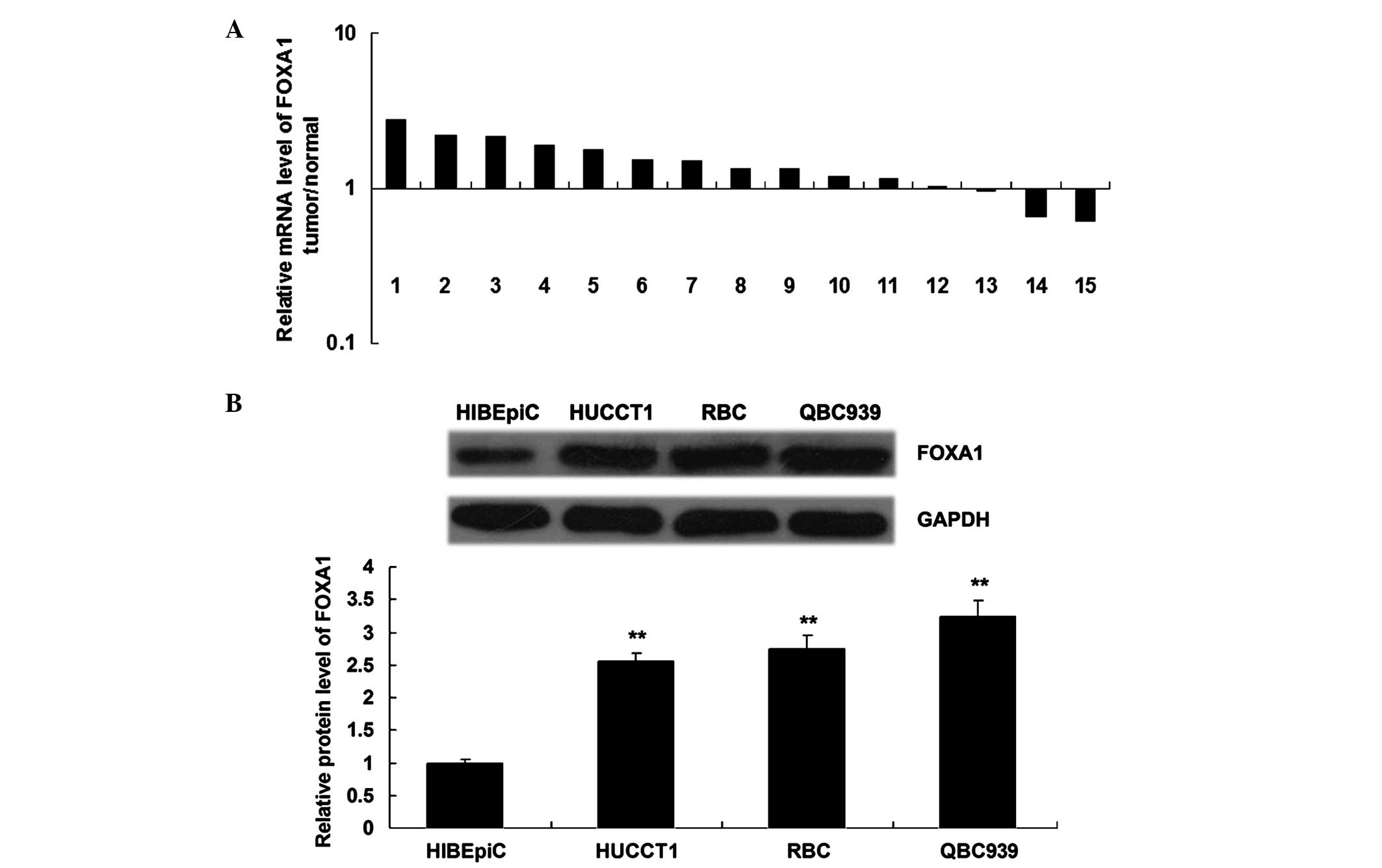|
1
|
Andersen JB: Molecular pathogenesis of
intrahepatic cholangiocarcinoma. J Hepatobiliary Pancreat Sci.
22:101–113. 2015. View
Article : Google Scholar : PubMed/NCBI
|
|
2
|
Sempoux C, Jibara G, Ward SC, Fan C, Qin
L, Roayaie S, Fiel MI, Schwartz M and Thung SN: Intrahepatic
cholangiocarcinoma: New insights in pathology. Semin Liver Dis.
31:49–60. 2011. View Article : Google Scholar : PubMed/NCBI
|
|
3
|
Sanada Y, Kawashita Y, Okada S, Azuma T
and Matsuo S: Review to better understand the macroscopic subtypes
and histogenesis of intrahepatic cholangiocarcinoma. World J
Gastrointest Pathophysiol. 5:188–199. 2014.PubMed/NCBI
|
|
4
|
Long XR, He Y, Huang C and Li J:
MicroRNA-148a is silenced by hypermethylation and interacts with
DNA methyltransferase 1 in hepatocellular carcinogenesis. Int J
Oncol. 44:1915–1922. 2014.PubMed/NCBI
|
|
5
|
Tamagawa S, Beder LB, Hotomi M, Gunduz M,
Yata K, Grenman R and Yamanaka N: Role of miR-200c/miR-141 in the
regulation of epithelial-mesenchymal transition and migration in
head and neck squamous cell carcinoma. Int J Mol Med. 33:879–886.
2014.PubMed/NCBI
|
|
6
|
Wan X, Cheng Q, Peng R, Ma Z, Chen Z, Cao
Y and Jiang B: ROCK1, a novel target of miR-145, promotes glioma
cell invasion. Mol Med Rep. 9:1877–1882. 2014.PubMed/NCBI
|
|
7
|
Liu X, Yan S, Pei C and Cui Y: Decreased
microRNA-132 and its function in human non-small cell lung cancer.
Mol Med Rep. 11:3601–3608. 2015.PubMed/NCBI
|
|
8
|
Zheng K, Liu W, Liu Y, Jiang C and Qian Q:
MicroRNA-133a suppresses colorectal cancer cell invasion by
targeting Fascin1. Oncol Lett. 9:869–874. 2015.PubMed/NCBI
|
|
9
|
Chen P, Zeng M, Zhao Y and Fang X:
Upregulation of Limk1 caused by microRNA-138 loss aggravates the
metastasis of ovarian cancer by activation of Limk1/cofilin
signaling. Oncol Rep. 32:2070–2076. 2014.PubMed/NCBI
|
|
10
|
Tavolaro S, Colombo T, Chiaretti S,
Peragine N, Fulci V, Ricciardi MR, Messina M, Bonina S, Brugnoletti
F, Marinelli M, et al: Increased chronic lymphocytic leukemia
proliferation upon IgM stimulation is sustained by the upregulation
of miR-132 and miR-212. Genes Chromosomes Cancer. 54:222–234. 2015.
View Article : Google Scholar : PubMed/NCBI
|
|
11
|
Qi B, Liu SG, Qin XG, Yao WJ, Lu JG, Guo
L, Wang TY, Li HC and Zhao BS: Overregulation of microRNA-212 in
the poor prognosis of esophageal cancer patients. Genet Mol Res.
13:7800–7807. 2014. View Article : Google Scholar : PubMed/NCBI
|
|
12
|
Jiang X, Chen X, Chen L, Ma Y, Zhou L, Qi
Q, Liu Y, Zhang S, Luo J and Zhou X: Upregulation of the
miR-212/132 cluster suppresses proliferation of human lung cancer
cells. Oncol Rep. 33:705–712. 2015.PubMed/NCBI
|
|
13
|
Liang X, Zeng J, Wang L, Fang M, Wang Q,
Zhao M, Xu X, Liu Z, Li W, Liu S, et al: Histone demethylase
retinoblastoma binding protein 2 is overexpressed in hepatocellular
carcinoma and negatively regulated by hsa-miR-212. PLoS One.
8:e697842013. View Article : Google Scholar : PubMed/NCBI
|
|
14
|
Ma C, Nong K, Wu B, Dong B, Bai Y, Zhu H,
Wang W, Huang X, Yuan Z and Ai K: miR-212 promotes pancreatic
cancer cell growth and invasion by targeting the hedgehog signaling
pathway receptor patched-1. J Exp Clin Cancer Res. 33:542014.
View Article : Google Scholar : PubMed/NCBI
|
|
15
|
Livak KJ and Schmittgen TD: Analysis of
relative gene expression data using real-time quantitative PCR and
the 2(−Delta Delta C(T)) Method. Methods. 25:402–408. 2001.
View Article : Google Scholar : PubMed/NCBI
|
|
16
|
Fabbri M, Calore F, Paone A, Galli R and
Calin GA: Epigenetic regulation of miRNAs in cancer. Adv Exp Med
Biol. 754:137–148. 2013. View Article : Google Scholar : PubMed/NCBI
|
|
17
|
Bouyssou JM, Manier S, Huynh D, Issa S,
Roccaro AM and Ghobrial IM: Regulation of microRNAs in cancer
metastasis. Biochim Biophys Acta. 1845:255–265. 2014.PubMed/NCBI
|
|
18
|
Wen KC, Sung PL, Yen MS, Chuang CM, Liou
WS and Wang PH: MicroRNAs regulate several functions of normal
tissues and malignancies. Taiwan J Obstet Gynecol. 52:465–469.
2013. View Article : Google Scholar : PubMed/NCBI
|
|
19
|
John K, Wu J, Lee BW and Farah CS:
MicroRNAs in head and neck cancer. Int J Dent. 2013:6502182013.
View Article : Google Scholar : PubMed/NCBI
|
|
20
|
Yamasaki S: Intrahepatic
cholangiocarcinoma: Macroscopic type and stage classification. J
Hepatobiliary Pancreat Surg. 10:288–291. 2003. View Article : Google Scholar : PubMed/NCBI
|
|
21
|
Zhao XQ, Ma HX, Su MS and He L:
Osteopontin promoter polymorphisms at locus −443 are associated
with metastasis and poor prognosis of human intrahepatic
cholangiocarcinoma in Chinese population. Int J Clin Exp Pathol.
7:6914–6921. 2014.PubMed/NCBI
|
|
22
|
Park JK, Henry JC, Jiang J, Esau C, Gusev
Y, Lerner MR, Postier RG, Brackett DJ and Schmittgen TD: miR-132
and miR-212 are increased in pancreatic cancer and target the
retinoblastoma tumor suppressor. Biochem Biophys Res Commun.
406:518–523. 2011. View Article : Google Scholar : PubMed/NCBI
|
|
23
|
Schultz NA, Andersen KK, Roslind A,
Willenbrock H, Wøjdemann M and Johansen JS: Prognostic microRNAs in
cancer tissue from patients operated for pancreatic cancer-five
microRNAs in a prognostic index. World J Surg. 36:2699–2707. 2012.
View Article : Google Scholar : PubMed/NCBI
|
|
24
|
Scapoli L, Palmieri A, Lo Muzio L,
Pezzetti F, Rubini C, Girardi A, Farinella F, Mazzotta M and
Carinci F: MicroRNA expression profiling of oral carcinoma
identifies new markers of tumor progression. Int J Immunopathol
Pharmacol. 23:1229–1234. 2010.PubMed/NCBI
|
|
25
|
Wada R, Akiyama Y, Hashimoto Y, Fukamachi
H and Yuasa Y: miR-212 is downregulated and suppresses
methyl-CpG-binding protein MeCP2 in human gastric cancer. Int J
Cancer. 127:1106–1114. 2010. View Article : Google Scholar : PubMed/NCBI
|
|
26
|
Incoronato M, Urso L, Portela A, Laukkanen
MO, Soini Y, Quintavalle C, Keller S, Esteller M and Condorelli G:
Epigenetic regulation of miR-212 expression in lung cancer. PLoS
One. 6:e277222011. View Article : Google Scholar : PubMed/NCBI
|
|
27
|
Qian X, Samadani U, Porcella A and Costa
RH: Decreased expression of hepatocyte nuclear factor 3 alpha
during the acute-phase response influences transthyretin gene
transcription. Mol Cell Biol. 15:1364–1376. 1995. View Article : Google Scholar : PubMed/NCBI
|
|
28
|
Hsiang CH, Marten NW and Straus DS:
Upstream region of rat serum albumin gene promoter contributes to
promoter activity: Presence of functional binding site for
hepatocyte nuclear factor-3. Biochem J. 338:241–249. 1999.
View Article : Google Scholar : PubMed/NCBI
|
|
29
|
Guzmán C, Benet M, Pisonero-Vaquero S,
Moya M, García-Mediavilla MV, Martínez-Chantar ML, González-Gallego
J, Castell JV, Sánchez-Campos S and Jover R: The human liver fatty
acid binding protein (FABP1) gene is activated by FOXA1 and
PPARalpha; and repressed by C/EBPalpha: Implications in FABP1
down-regulation in nonalcoholic fatty liver disease. Biochim
Biophys Acta. 1831:803–818. 2013. View Article : Google Scholar : PubMed/NCBI
|
|
30
|
Horimoto Y, Arakawa A, Harada-Shoji N,
Sonoue H, Yoshida Y, Himuro T, Igari F, Tokuda E, Mamat O, Tanabe
M, et al: Low FOXA1 expression predicts good response to
neo-adjuvant chemotherapy resulting in good outcomes for luminal
HER2-negative breast cancer cases. Br J Cancer. 112:345–351. 2015.
View Article : Google Scholar : PubMed/NCBI
|
|
31
|
Zhang Y and Tong T: FOXA1 antagonizes
EZH2-mediated CDKN2A repression in carcinogenesis. Biochem Biophys
Res Commun. 453:172–178. 2014. View Article : Google Scholar : PubMed/NCBI
|
|
32
|
Yu W, Qiao Y, Tang X, Ma L, Wang Y, Zhang
X, Weng W, Pan Q, Yu Y, Sun F and Wang J: Tumor suppressor long
non-coding RNA, MT1DP is negatively regulated by YAP and Runx2 to
inhibit FoxA1 in liver cancer cells. Cell Signal. 26:2961–2968.
2014. View Article : Google Scholar : PubMed/NCBI
|
|
33
|
Zhao Y and Li Z: Interplay of estrogen
receptors and FOXA factors in the liver cancer. Mol Cell
Endocrinol. S0303–S7207. 2015.
|




















